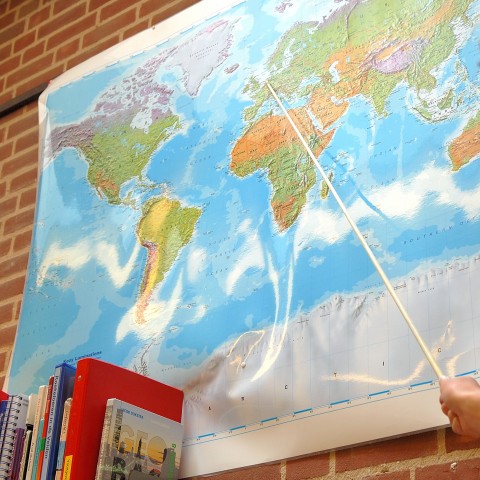
Learning is a lifetime pursuit. So if you are embarking on an educational experience in Brazil, there are some Portuguese classroom phrases you should learn. This way, you will be able to follow your teacher’s instructions, greet your colleagues and make the most of the experience!
Whether you plan to spend a semester abroad or you are going to teach in Brazil, it’s a good idea to familiarize yourself with some of the specific vocabularies. Once you find the most common Portuguese phrases and words used in the classroom, you can focus on the most important thing: learning!
In this article, we will cover vocabulary for the supplies you will need, classroom items, and subject names. You will also learn sentences and phrases to follow your teacher’s instructions and ask for clarifications. Finally, you’ll see how to explain tardiness and absences, and how to talk about your favorite courses.
Ready to learn Portuguese phrases for the classroom? Let’s get started!

Grab a pen and some paper and get ready to take notes!
 Table of Contents
Table of Contents
- Classroom Greetings
- Teacher Instructions in Portuguese
- Ask Questions in Portuguese
- Explain Absence and Tardiness in Portuguese
- Talking About Your Favorite Subjects in Portuguese
- School Supplies and Classroom Vocabulary in Portuguese
- Continue Learning More Portuguese with PortuguesePod101
1. Classroom Greetings
When you arrive at your educational institution or classroom, ready to learn the Portuguese language, the first thing you will have to do is greet people. Whether you’re saying hi to your friends and colleagues or saying good morning to your teacher and professors, there are a few phrases you need to learn.
But first, here is some important context and vocabulary. In Portuguese, we use the same words for teacher and professor: professor (male) and professora (female). When addressing a teacher or professor, you can use the word professor(a) by itself or include the professor’s name afterward. In Brazil, we usually use the professor’s first name.
You should know that, in general, the relationship between professors and students in Brazil tends to be more informal than in other countries. So don’t be surprised if you hear people calling professors directly by their name or using você (“you”). A more polite way to address teachers and professors is to use the form o senhor (“the sir”) or a senhora (“the madam”).
Now, let’s see how to greet people in the classroom.
- Bom dia, professor. (“Good morning, teacher.”)
- Oi professor, tudo bem? (“Hi teacher, how are you?”)
- Boa tarde, turma. (“Good afternoon, class.”)
- Estão dispensados. Tenham um bom fim de semana. (“You are dismissed. Have a good weekend.”)
- Até amanhã. (“See you tomorrow.”)
- Até semana que vem. (“See you next week.”)
- ➜ Learn how to say the five most common phrases used in a Classroom with this audio lesson on PortuguesePod101.
2. Teacher Instructions in Portuguese
Class just began. You are listening attentively to your teacher, but suddenly they ask you a question. You better know what they are saying to avoid any confused stares. Who knows, you might even be able to help your colleagues if they are having trouble understanding!
Or perhaps, you are planning to teach in Brazil for some time. In this case, here are some must-know classroom phrases for teachers in basic Portuguese:
- Silêncio, por favor. (“Silence, please.”)
- Sentem-se, por favor. (“Sit down, please.”)
- Os alunos lá atrás conseguem me ouvir? (“Can the students in the back hear me?”)
- Isto é importante, então prestem atenção. (“This is important, so pay attention.”)
- Hoje vamos estudar tempos verbais. (“Today we are going to study verb tenses.”)
- Abram o livro na página 394. (“Open the book on page 394.”)
- Peguem seus cadernos. (“Get your notebooks.”)
- Alguém sabe me dizer porque esta resposta está errada? (“Can anyone tell me why this answer is wrong?”)
- O que isso quer dizer? (“What does that mean?”)
- Quem sabe responder esta questão? (“Who can answer this question?”)
- Repitam comigo. (“Say it with me.”)
- Escrevam, por favor. (“Write it down, please.”)
- Alguma dúvida? Está claro? (“Any questions? Is it clear?”)
- Para este exercício, podem trabalhar em pares ou grupos de três estudantes. (“For this exercise, you can work in pairs or groups of three students.”)
- Formem grupos de cinco pessoas. (“Form groups of five people.”)

Quem sabe responder esta pergunta? (“Who knows how to answer this question?”)
3. Ask Questions in Portuguese
It’s absolutely normal that, when following a class, some things are not immediately clear. You may not understand something the professor said, or maybe you are confused about some of the course material. Either way, knowing how to ask questions and clarifications is an important step for a better Portuguese language learning experience.
- O que o professor disse? (“What did the teacher say?”)
- Desculpe, não entendi. Pode repetir? (“Sorry, I do not understand. Can you repeat it?”)
- Pode explicar mais uma vez? (“Can you explain it one more time?”)
- Pode falar um pouco mais devagar, por favor? (“Can you speak a little slower, please?”)
- O que significa isso? (“What does that mean?”)
- Como posso dizer isto em português? (“How can I say this in Portuguese?”)
- Eu tenho uma dúvida: como posso…? (“I have a question: how can I…?”)
- Eu não sei como dizer isto. (“I don’t know how to say this.”)
- Com licença, professor. Posso ir ao banheiro? (“Excuse me, teacher. Can I go to the bathroom?”)
4. Explain Absence and Tardiness in Portuguese
Let’s face it. Stuff happens – maybe you weren’t able to finish an assignment by the deadline. Or maybe you went out with friends and missed your alarm clock in the morning. It’s a good idea to know how to apologize… or make up excuses.
The infamous phrase “My dog ate my homework” can be translated to Portuguese as Meu cachorro comeu meu dever de casa. Everyone will know what it means if you say it, even though it is originally an anglophone sentence.
Need a more believable excuse for being late? Public transportation can be quite flaky in Brazil. Say your bus was late, and you might successfully explain your tardiness without problems.
Here are possible ways to justify absence or delay.
- Desculpa, professor, mas eu não consegui terminar o trabalho. (“Sorry, professor, but I couldn’t finish the assignment.”)
- Eu não fiz o dever de casa. (“I did not do my homework.”)
- Eu não consegui terminar a lição de casa. (“I did not do my homework.”)
- Desculpe o atraso, o ônibus atrasou. (“Sorry for the delay, the bus was late.”)
- Eu estou um pouco mal, não vou para a aula hoje. (“I’m a little sick, I’m not going to class today.”)
- Não me sinto muito bem. Posso ser dispensado hoje? (“I don’t feel well. Can I be excused for the day?”)
- Estou doente, então vou faltar à escola hoje. Mas eu tenho um atestado médico. (“I’m sick, so I’m going to miss school today. But I have a doctor’s sick note.”)
| /! There are two ways of saying homework in Portuguese: lição de casa or dever de casa. It’s common to only say lição or dever, though. |
- ➜ If you need a refresher lesson on Apologies in Portuguese, PortuguesePod101 is here to help!

Public transportation will never be this empty in Brazil. But you may still have a chance to read!
5. Talking About Your Favorite Subjects in Portuguese
We hope you enjoy some of the courses and subjects you study. That’s the key to enjoy studying!
The first step to talking about the subjects you enjoy – and the ones you don’t enjoy as much – is to know their names in Portuguese.
| Portuguese | English |
| Inglês | English |
| Português | Portuguese |
| Espanhol | Spanish |
| Literatura | Literature |
| Matemática | Mathematics |
| Física | Physics |
| Química | Chemistry |
| Biologia | Biology |
| Geografia | Geography |
| História | History |
| Artes | Arts |
| Filosofia | Philosophy |
| Economia | Economy |
| Sociologia | Sociology |
| Psicologia | Psychology |
| Administração | Business Administration |
| Informática | Computing, IT |
| Música | Music |
| Educação Física | Physical Education (PE) |
And here are some basic Portuguese phrases and conversations discussing subjects:
- O professor de Matemática está atrasado. (“The Mathematics teacher is late.”)
- Estou indo para a aula de Espanhol. (“I’m going to Spanish class.”)
- Qual é a sua matéria preferida? (“What is your favorite subject?”)
- Minha matéria favorita é Filosofia. (“My favorite subject is Philosophy.”)
- Eu tenho boas notas em Inglês. (“I have good grades in English.”)
- Eu sou péssimo(a) em Física. (“I’m very bad at Physics.”)
- Tenho que revisar a matéria da aula de História. (“I have to review the material for History class.”)
- Você precisa de ajuda para estudar? Eu sou boa em História. (“Do you need help studying? I’m good at History.”)
- Ah sim, por favor. E eu posso te ajudar com Inglês, se você quiser. (“Oh yes, please. And I can help you with English if you want.”)
- Amanhã é a prova de Química. (“The Chemistry test is tomorrow.”)

You better like biology if you want to be a doctor.
6. School Supplies and Classroom Vocabulary in Portuguese
You know that moment when you are sitting at your desk, watching the professor write on the black board, you pull up your notebook from your backpack… And then you see that you forgot your pencil case. Now you need to ask your colleagues for a pen.
All of those Portuguese words in the sentence above are important classroom vocabulary to know. After that, you can borrow and lend things to your colleagues, point out items in the classroom and more.
Let’s start with a list of supplies:
| Portuguese | English |
| Uma mochila | A backpack |
| Um estojo | A pencil case |
| Um lápis | A pencil |
| Uma lapiseira | A mechanical pencil |
| Uma caneta | A pen |
| Uma borracha | An eraser |
| Um apontador | A sharpener |
| Um marca-texto | A highlighter |
| Um marcador | A marker, a sharpie |
| Um caderno | A notebook |
| Um livro (didático) | A textbook |
| Uma calculadora | A calculator |
| Uma régua | A ruler |
| Um compasso | A compass |
Now, for the classroom vocabulary:
| Portuguese | English |
| Uma carteira, uma mesa | A desk |
| Uma cadeira | A chair |
| Um projetor | A projector |
| Uma tela | A screen |
| Um quadro | A board |
| Um quadro-negro | A blackboard |
| Um monitor | A (computer) monitor |
| Um relógio | A clock |
| Um mapa-múndi | A world map |
Finally, here are a few more Portuguese classroom phrases for students:
- Eu esqueci meu livro. Posso sentar com você? (“I forgot my book. Can I sit with you?”)
- Eu perdi meu estojo. Você pode me emprestar um lápis? (“I lost my pencil case. Can you lend me a pencil?”)
- Claro! Mas é bom apontar esse lápis antes de usar. Aqui, pode usar meu apontador. (“Of course! But it ‘s better to sharpen that pencil before using it. Here, you can use my sharpener.”)
- Você tem uma caneta para me emprestar? (“Do you have a pen I can borrow?”)
- Todos trouxeram réguas e calculadoras para a prova? (“Did everyone bring rulers and calculators to the test?”)
- Professor, minha calculadora não está funcionando. Alguém tem uma calculadora extra para emprestar? (“Professor, my calculator is not working. Does anyone have an extra calculator to lend me?”)

O mapa-múndi (“The world map”)
- ➜ Listen to how these Portuguese words are pronounced with the Classroom Vocabulary List, available for free on PortuguesePod101!
7. Continue Learning More Portuguese with PortuguesePod101
With this guide, you are now ready to boost your Portuguese language learning, get into a classroom in Brazil and understand all of the Portuguese classroom words and phrases! Learning can be an exciting journey. And now you’re even more prepared for it. Next step: bonding with colleagues and interacting with professors – in Portuguese of course! Luckily, there are plenty of resources on PortuguesePod101 to help you with that.
What did you think of this guide? Do you feel prepared to follow your teacher’s instructions or ask questions to your colleagues? Let us know in the comments below.
Now, continue learning Portuguese with the hundreds of free Portuguese resources and the many vocabulary lists available on PortuguesePod101.com. Go ahead and choose your favorite tools to expand your learning opportunities.
If you want to take your learning experience further, members of PortuguesePod101.com get access to the largest language lesson library in the world, with thousands of real lessons by real teachers. With Premium PLUS, you will have your own personalized learning program, with weekly assignments, based on your needs! Perfect for anyone who wants to learn from anywhere, feel motivated, and be ready to speak Portuguese with confidence. And in the meantime, continue exploring PortuguesePod101!









